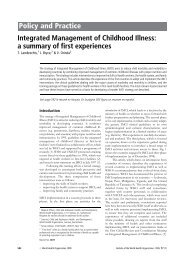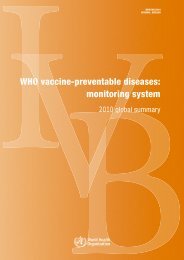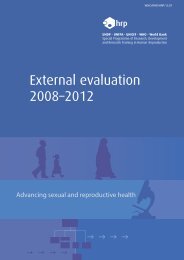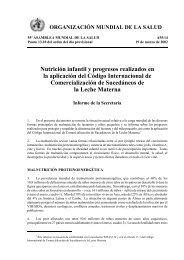IPDE - Extranet Systems - World Health Organization
IPDE - Extranet Systems - World Health Organization
IPDE - Extranet Systems - World Health Organization
Create successful ePaper yourself
Turn your PDF publications into a flip-book with our unique Google optimized e-Paper software.
83 Discussion and Conclusions<br />
Repetitions can lead to boredom and decreased motivation. Patients may<br />
also believe that the interviews are no longer for their benefit but for that<br />
of the examiner. Repetitions can also produce fantasies that the interviewer<br />
is dissatisfied with the previous interview or is checking on the<br />
consistency of the responses. Patients may also refrain from providing as<br />
many positive replies as previously because of a heightened awareness<br />
that these invite further probing and prolong the interview. Elsewhere,12<br />
I have argued that the problem of attempting to measure the precise<br />
degree to which interviewers are interchangeable is reminiscent of the<br />
Heisenberg principle in physics: one cannot measure the phenomenon<br />
without somehow tampering with it in the process.<br />
Another source of temporal instability is the possibility that patients<br />
in a dysphoric state may have a selective recall or distorted perception of<br />
certain personality traits. They may also confuse them with the symptoms<br />
of another (Axis I) mental disorder. An earlier version of the PDE<br />
proved resistant to changes in symptoms of anxiety and depression<br />
during the course of treatment? In that study, the majority of patients<br />
had mood or anxiety disorders of mild to moderate severity. The finding<br />
has since been replicated with the DSM-III-R component of the <strong>IPDE</strong><br />
(Loranger & Lenzenweger, 1992 unpublished). There is, however, a<br />
contradictory report based on a group of depressed patients treated<br />
with cognitive therapy.13 That study used an earlier version of the PDE<br />
and the authors failed to specify the professional status and training<br />
of the interviewers, a potentially relevant variable. It may require an<br />
experienced psychiatrist or clinical psychologist to distinguish personality<br />
traits from transient pathological mental states and the symptoms<br />
of other disorders. The reliability and validity of the <strong>IPDE</strong>, like that of<br />
any semistructured inteniew, cannot he judged apart from the qualifications<br />
of the interviewers. At times, semistructured interviews have<br />
assumed a mystique of their own. and that caveat all too often ignored.<br />
The <strong>IPDE</strong> is intended for use by those who have the clinical sophistication<br />
and training required to make psychiatric diagnoses independently,<br />
i.e., without a semistructured interview. This is not to imply that the<br />
<strong>IPDE</strong> or any other PD interview is necessarily impervious to the influence<br />
of abnormal mental states, particularly those characterized by<br />
severe symptoms. We are encouraged. however, by the evidence that<br />
some clinical states do not appear to invalidate the assessment of personality.<br />
In any event, no attempt was made to determine the extent to which<br />
trait-state artifacts may have affected the stability of the <strong>IPDE</strong> in the<br />
present study.

















